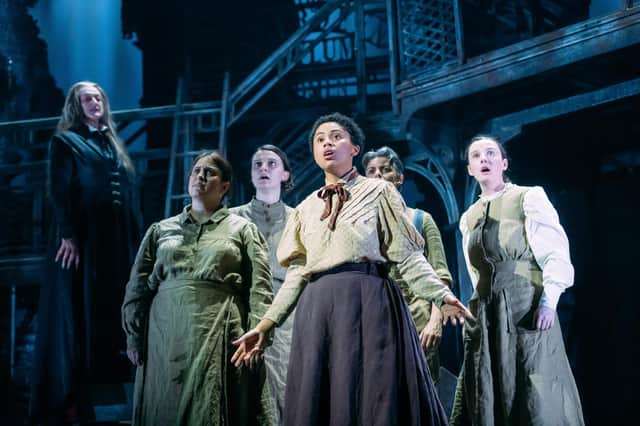Review: Feminist retelling of Dracula misses the mark on Coventry stage


Can you have too much of a good thing? Well, in Dracula: Mina’s Revenge it would seem you can.
Part horror, part comedy, part feminist re-telling of the classic story, the ingredients were all there for an original and entertaining piece of theatre. And certainly it was spectacular to watch, with an intricate set over which the cast flowed in deftly choreographed patterns.
Advertisement
Hide AdAdvertisement
Hide AdThe setting was original, too, located as it was partly in a private lunatic asylum for women in the north of Scotland in the 1890s where Mina (Danielle Jam), the lawyer Jonathan Harker’s (Catriona Faint) fiancé, is working. Her friend, Lucy (Ailsa Davidson) who, in a variation on the original plot, is engaged to the superintendent of the asylum, Dr John Seward (Maggie Bain), is also present at the asylum, though constrained in her activities by her husband’s benevolent but patronising belief, common at the time, that activities such as reading damaged a woman’s ovaries and hence her ability to fulfil her natural role.
In keeping with the original story, Harker travels to Count Dracula’s (Liz Kettle) castle to arrange the purchase of a property, now set close to the asylum, to which the Count arrives and begins to wreak havoc on the populace, first biting and enslaving Lucy, who then goes on to kill others. Seward, concerned at his fiancé’s mysterious illness brings in his friend, Dr Van Helsing (Natalie Arle-Toyne) to effect a cure.
It is at this point that the play veers wildly towards the ridiculous. For some reason Van Helsing is played for laughs, whereas up to this point the play was fairly serious horror, albeit touched by fairly lightweight social commentary. She speaks in a strange pseudo-Dutch accent which wobbled a bit, and struts around the stage as if she were Indiana Jones cracking jokes instead of a whip. Why she should inject this line of humour was beyond me, though in keeping with the theme of injection she gives Lucy a transfusion of “a strong man’s blood” from Seward in a vain attempt to cure her. Thus the feminist theme is strengthened, for this is an all-female cast who in many cases continued to play the traditional male roles. The ending stretched the limits of this reviewer’s credulity too far as it seemed to suggest that Dracula offered not a living death to her victims but a new life free from patriarchy.
There is plenty of scope for revisiting old stories and themes from a fresh, female perspective and heaven knows patriarchy deserves to be overturned as often as possible. But within the play there has to be a good reason for this reversal. Here it seemed to me to be done because it could be done and was likely to be popular, and thus the resistance to oppression seemed forced. The psychology and symbolism of the story, which has a lot to do with sex and erotic desire, was completely missed.
Advertisement
Hide AdAdvertisement
Hide AdI have to say I was in a minority on the night, because the audience, many of whom to judge by their dress were strong fans of the story, gave it a standing ovation.
Until October 21. Tickets from belgrade.co.uk